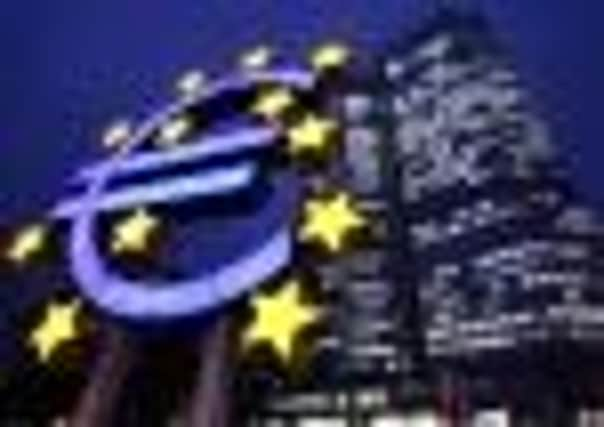Euro rises as proposals for further monetary union gain momentum


Recent days have seen a raft of gloomy economic data, with jobs growth in the US falling well short of forecasts and a weakening manufacturing sector in China, but the euro gained as much as 0.5 per cent against the dollar and 0.6 per cent against the yen after Nowotny backed comments from Spain’s prime minister, Mariano Rajoy, who supports more fiscal integration.
A banking union could combine national deposit guarantee schemes at European level, a fund to salvage failing banks and some centralisation of supervision. “The ideas for this are certainly correct, but you cannot be misled,” Nowotny said, adding that “significant time” would be needed to implement the plans.
Advertisement
Hide AdAdvertisement
Hide AdRajoy said at the weekend that he supported the creation of a single European authority to oversee fiscal policy in the eurozone, although he acknowledged that member states would have to surrender more of their fiscal autonomy for this to happen.
He said the authority would also go a long way to alleviating Spain’s woes which, along with the prospect of a Greek euro exit, have threatened to derail the single currency project.
Spain is under pressure to reveal what it intends to do about its troubled banking sector, which is sitting on massive amounts of toxic real estate investments. Troubled Bankia needs €19 billion (£15.4bn) in government aid, but Spain only has €5bn left of a €19bn fund it established in 2009 to help banks.
EU economic and monetary affairs commissioner Olli Rehn said there was a “serious possibility” that the European Stability Mechanism (ESM) rescue fund could be used to directly capitalise banks, although he said the ESM’s treaty does not allow this and leaders needed to work out how to overcome that.
Rehn said: “We are now moving on in the discussion on the possible ways and means to create a banking union.”
Commerzbank analyst Ulrich Leuchtmann said politicians will have to react fast, otherwise the euro will trend downwards against the dollar “as the crisis will not be solved but only contained once again”.
Eurobonds, or debt issued jointly by eurozone countries, is another option likely to be discussed at the EU summit on 28 June, although Germany remains opposed because it says it would lower incentives for indebted countries to heal their finances.
Factory prices across the 17 countries using the euro were unchanged in April, confounding expectations of a 0.2 per cent rise and marking the fourth straight month of weakening inflation pressures.
Advertisement
Hide AdAdvertisement
Hide AdEconomists said the news, combined with grim global economic data and a drop in oil prices, may not be enough to convince the European Central Bank to trim rates at tomorrow’s meeting, but many believe it will have to take action soon to stimulate growth.
Howard Archer, chief UK and European economist at IHS Global Insight, said the ECB “will prefer to wait and see what happens with the mid-June Greek elections and their aftermath, as well as with near-term growth and inflation developments”.
He added: “However, we now expect the ECB to trim interest rates in the third quarter, with July a very real possibility.”
Comments by the ECB’s Ewald Nowotny boosted the single currency yesterday:
0.5% euro gains against the dollar
0.6% euro gains against the yen